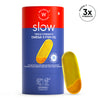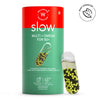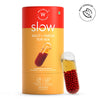Omega-3 fatty acids are crucial/essential to keep your body healthy. They’re linked to a better immune system, brain function, joint and eye health, and cardiovascular health. However, as your body can’t produce omega-fatty acids alone, you must consume them from your diet.
And when it comes to consuming omega-3 fatty acids, there’s fish omega for non-vegetarians and vegan omega for vegans and vegetarians. But apart from the sources, how are vegan omega and fish omega different, and which one’s better? Well, read along to find out.
This blog briefly differentiates vegan Omega 3 and fish oil. Also, there’s a reliable source of triple omega that you can consume to ensure better health. So, read in full.
What are Omega-3 Fatty Acids?
Omega-3s are a family of essential fatty acids required to keep your body healthy. There are three important types of omega-3 fatty acids: Alpha-linolenic acid (ALA), docosahexaenoic acid (DHA), and eicosapentaenoic acid (EPA), which are essential for your body.
What is Fish Oil?
Fish oil is a dietary supplement derived from the tissues of fatty fish, such as salmon, mackerel, herring, and sardines. It is rich in omega-3 fatty acids, essential polyunsaturated fats crucial for various bodily functions. Fish oil’s primary omega-3 fatty acids are eicosapentaenoic acid (EPA) and docosahexaenoic acid (DHA). These fatty acids support cardiovascular health, reduce inflammation, and promote brain function. While obtaining omega-3s from dietary sources like fatty fish is ideal, fish oil supplements are a convenient way to ensure an adequate intake, especially for those who may not regularly consume fish.
Benefits of Fish Oil
-
Cardiovascular Health
Fish oil, rich in omega-3 fatty acids, promotes cardiovascular health by lowering triglycerides, reducing blood pressure, and improving cholesterol levels. Its anti-inflammatory properties protect against atherosclerosis, enhancing arterial flexibility. Fish oil also aids in preventing arrhythmias, supporting overall heart function, and positively influencing endothelial cells for optimal vascular health.
-
Brain Function and Mental Health
Fish oil, abundant in omega-3 fatty acids like DHA, supports brain function and mental health. DHA is a critical component of brain tissue, aiding cognitive development and function. Regular consumption may reduce cognitive decline, alleviate depression symptoms, and enhance mood, contributing to overall mental well-being and neurological health.
-
Eye Health
Fish oil, containing DHA, plays a vital role in maintaining eye health. DHA is a significant component of the retina, supporting visual development and function. Regular consumption of fish oil may help prevent age-related macular degeneration, reduce dry eye symptoms, and promote overall eye health for optimal vision.
Risks and Side Effects of Fish Oil
-
Contamination with Mercury
Contamination with mercury is a potential risk associated with fish oil consumption. Certain fish species may contain high levels of mercury, which, if ingested regularly, can lead to adverse health effects, particularly for pregnant women and children. Choosing purified or molecularly distilled fish oil supplements can help minimize this risk.
-
Digestive Issues and Fishy Aftertaste
Fish oil supplements may cause digestive issues and a fishy aftertaste. Some people may experience bloating, diarrhea, or indigestion. The characteristic fishy burps or aftertaste can be off-putting. Opting for enteric-coated capsules or meal supplements can help minimize these side effects, improving overall tolerability.
-
Allergic Reactions
Allergic reactions, though rare, can occur with fish oil supplementation. Individuals allergic to fish or shellfish may experience symptoms such as itching, swelling, or difficulty breathing. It's crucial to consult a healthcare professional before taking fish oil supplements, especially for those with known seafood allergies.
Recommended Dosage and How to Choose a Fish Oil Supplement
The recommended dosage of fish oil depends on individual health goals. For general cardiovascular health, a common dosage is around 250-500 milligrams of combined EPA and DHA per day. However, higher doses may be advised for specific conditions. Opt for products with third-party testing for purity and potency when choosing a supplement. Look for a ratio of EPA to DHA that aligns with your health objectives. Consider the form, such as triglyceride or ethyl ester, and choose supplements with added antioxidants for stability. Consult a healthcare professional for personalized advice based on your health status and goals.
What are Vegan/Plant-Based Omega-3 Sources?
Vegans and individuals following a plant-based diet can obtain omega-3 fatty acids from various plant sources. While these sources provide alpha-linolenic acid (ALA), which the body can convert into EPA and DHA, the conversion rates are relatively low. Plant-based omega-3 sources include:
- Flaxseeds and Flaxseed Oil
- Chia Seeds
- Hemp Seeds
- Walnuts
- Algal Oil Supplements
- Seaweed and Algae
Benefits of Plant-Based Omega-3 Sources
-
Heart Health Benefits
Plant-based omega-3 sources offer notable heart health benefits. Flaxseeds, chia seeds, hemp seeds, and walnuts provide alpha-linolenic acid (ALA), promoting cardiovascular well-being. ALA contributes to lower blood triglyceride levels, reducing the risk of heart disease. Additionally, these sources exhibit anti-inflammatory properties, supporting arterial health and flexibility. For vegans or those preferring plant-based alternatives, these sources contribute to overall cardiovascular wellness, complementing a heart-conscious lifestyle.
-
Anti-Inflammatory Properties
Plant-based omega-3 sources offer significant anti-inflammatory benefits. Flaxseeds, chia seeds, hemp seeds, and walnuts provide alpha-linolenic acid (ALA), a precursor to anti-inflammatory compounds. ALA's conversion to EPA and DHA is limited, yet its inherent anti-inflammatory properties positively impact the body. These sources help modulate inflammatory responses, reducing inflammation in joints and tissues. Algal oil supplements directly provide DHA and contribute to anti-inflammatory effects. Including these plant-based omega-3 sources in the diet may assist in managing chronic inflammation, benefiting overall health and potentially alleviating symptoms associated with inflammatory conditions. Regular consumption supports a holistic approach to wellness and inflammatory balance.
-
Sustainable and Ethical Considerations
Choosing plant-based omega-3 sources aligns with sustainable and ethical considerations. Unlike fish oil, which can contribute to overfishing and environmental degradation, plant sources like flaxseeds, chia seeds, and hemp seeds are eco-friendly. These crops require less environmental resources and do not involve harming marine ecosystems. Algal oil, derived from algae, provides a direct source of DHA without impacting marine life. Embracing plant-based alternatives supports the ethical treatment of animals and aligns with environmentally conscious choices, promoting a sustainable and compassionate approach to nutrition that respects both planetary and ethical considerations.
Types of Vegan/Plant-Based Omega-3 Sources
Vegans and individuals following a plant-based diet can obtain omega-3 fatty acids from various plant sources. While these sources provide alpha-linolenic acid (ALA), which the body can convert into EPA and DHA, the conversion rates are relatively low. Plant-based omega-3 sources include:
Flaxseeds and Flaxseed Oil: Rich in ALA, flaxseeds and flaxseed oil are versatile additions to salads, smoothies, or cereals.
Chia Seeds: Chia seeds are high in ALA and can be easily incorporated into beverages, yogurt, or desserts.
Hemp Seeds: Hemp seeds balance omega-3 and omega-6 fatty acids. Sprinkle them on salads, yogurt, or blend them into smoothies.
Walnuts: Walnuts contain ALA and can be enjoyed as a snack or added to oatmeal, salads, or baked goods.
Algal Oil Supplements: Algal oil is derived from algae and provides a direct source of DHA and, in some cases, EPA. It's one of the best vegan Omega 3 supplements for those seeking an alternative to fish oil.
Certain types of seaweed and algae contain small amounts of omega-3s. However, the amounts may vary; not all types are good sources. So, while opting for vegetarian Omega 3 supplements, check for the amounts and sources.
Incorporating Omega-3s from Plant-based Sources into the Diet
Incorporating omega-3s from plant-based sources into the diet is vital for individuals following vegan or plant-based lifestyles. Flaxseeds and flaxseed oil, rich in alpha-linolenic acid (ALA), can be easily blended into smoothies, sprinkled on yogurt, or added to cereals for a nutrient boost. With their high ALA content, chia seeds offer a versatile option—whether soaked in beverages, mixed into oatmeal, or incorporated into desserts. Hemp seeds, delivering a balance of omega-3 and omega-6 fatty acids, make excellent toppings for salads and yogurts or can be incorporated into energy bars.
With their crunch and ALA content, walnuts serve as a satisfying snack or enhance the flavor and nutrition of salads and baked goods. Algal oil supplements, derived from algae, are an increasingly popular choice for a direct source of DHA and, in some cases, EPA. These can be seamlessly integrated into daily routines, ensuring a consistent omega-3 intake.
Considering the variations in conversion rates of ALA to EPA and DHA, individuals may opt for algal oil supplements for a more direct and reliable source of these essential fatty acids. Regularly monitoring omega-3 levels and consultation with healthcare professionals or registered dietitians helps tailor plant-based omega-3 intake to individual needs for optimal health and well-being.
Vegan Omega 3 vs Fish Oil: Understanding the Difference
How Are They Different?
Fish or virgin omega is basically omega-3 fatty acids from marine sources such as fish (salmon, cod, sardine, herring, mackerel, etc.). On the other hand, vegan omega contains omega-three fatty acids extracted from plant sources such as algae, seaweed, chia seeds, Brussels sprouts, flaxseeds, hemp seeds, walnuts, etc.
What Omega-3 Fatty Acids They Contain
Vegan omega or plant-based omega-3s provide mainly alpha-linoleic acid or ALA and are not abundant in EPA and DHA except for algae and seaweed. The body naturally converts ALA into longer-chain omega-3 fatty acids, docosahexaenoic acid (DHA), which is essential for brain health, and eicosapentaenoic acid (EPA).
And your body is known to convert this ALA into DHA and EPA. On the other hand, fish omega, along with Omega-3, provides EPA and DHA as well.
Which One Offers More Benefits
When you compare vegan omega 3 vs fish omega 3, Vegan omega contains only ALA and offers you benefits (reduces the risk of heart diseases), but are quite limited. On the other hand, fish omega contains EPA and DHA, offering way more benefits than ALA, such as vision support, enhanced recovery, lower inflammation, proper fetal development, anticoagulation, better heart health, growth, and development.
Verdict: Which One Is Better?
If you are wondering, is vegan omega 3 as good as fish oil? Vegan Omega was crafted to help vegans meet their body’s need for omega-3 fatty acids. However, it contains only 1 of the three omega-3 fatty acids ALA. And unfortunately, your body’s ability to convert it into DHA and EPA is relatively poor.
For instance, 5% of the total ALA is converted to EPA, and less than 0.5% of ALA is converted to DHA. This means that even after consuming vegan omega, you’ll have to resort to fish omega to get all the omega-3 fatty acids you need. Furthermore, if you consider the fish oil benefits, they are way more than plant or vegan omega.
Although, according to the above explanation, fish omega seems to be better, it actually depends on your personal preferences. So, to answer your question, are vegan omega 3 supplements effective? Yes, they are not as effective as Virgin Omega 3 or fish oil.
For instance, if you’re a vegan, you can go for vegan omega that offers your ALA and other vegan omega 3 supplements offering you EPA and DHA to fulfill your body’s requirement and reap the maximum benefits.
Up For Fish Omega? Here’s What You Need To Know
If you’re a non-vegetarian and are up for consuming fish omega, make sure to choose the correct supplement. It’s because fish omega supplements are usually made without using molecular distillation and fractionation processes, which means the fish oil may still contain impurities, heavy metals, etc.
What’s more, to cut costs, fish oil is mass-produced, and low-quality fish are brought to use. This can significantly lower the amount of omega-3s in the oil. Furthermore, that obnoxious aftertaste and fish burps are other reasons to choose the right fish omega supplement.
So, to save you time, we have found a reliable fish omega supplement: Virgin Omega 3.
What is Virgin Omega 3?
Virgin Omega 3 is a scientifically crafted source of omega-3 fatty acids that comes with triple-strength extra virgin fish oil. The supplement offers the highest concentration of essential fatty acids. It means 1240mg of this supplement offers you around 868 mg of essential fatty acids (DHA-372mg, EPA-496mg). Also, this supplement
Is molecularly distilled for added purity. So, no heavy metals or impurities.
Extracts omega-3s from pristine deep-sea salmon. So, the highest quality omega-3s for you.
Comes in the form of enteric-coated capsules that prevent burps and aftertaste.
Here are the Omega 3 benefits you can expect:
- Healthy Brain and Heart
- Better Vision
- Improved Immunity
- Strengthened Joints and Bones
- Enhanced Skin Health
What’s more, Virgin Omega 3 is highly absorbable because of its unique 2-in-1 capsule form. The capsule contains fast-absorbing virgin triple omega oil along with slow-release curcumin beadlets.
Wrapping Up
Omega-3 fatty acids are important to keep your body healthy. So, if you’re vegan, go for foods such as flax seeds, pumpkin seeds, and other sources of omega-3 supplements. However, if you’re a non-vegan, order Virgin Omega 3 with triple-strength fish oil for EPA & DHA and consume nuts and seeds to get your share of ALA. This way, you can give your body the vital omega-3s it needs.
FAQs
-
Is vegan omega 3 effective as fish oil?
Vegan omegas, while providing essential fatty acids, may have lower efficacy than fish oil in delivering pre-formed EPA and DHA, requiring attention to conversion rates and potential supplementation for optimal health benefits.
-
Which Omegas are the healthiest?
Omega-3 fatty acids, particularly EPA and DHA found in fatty fish and algal oil, are considered the healthiest, offering cardiovascular, cognitive, and anti-inflammatory benefits.
-
Is plant-based omega-3 enough?
Plant-based omega-3 sources can provide essential alpha-linolenic acid (ALA), but attention to conversion rates and potential supplementation with algal oil may be necessary for adequate levels of EPA and DHA.
-
Can humans absorb omega-3 from plants?
While humans can absorb omega-3 from plant sources, the conversion of alpha-linolenic acid (ALA) to the more beneficial forms of EPA and DHA is limited, making it essential to monitor intake and consider algal oil supplementation for optimal omega-3 levels.
-
Which fruit has the most omega-3?
Walnuts are dry fruits containing notable omega-3 fatty acids, specifically alpha-linolenic acid (ALA).
References
Gutiérrez S, Svahn SL, Johansson ME. Effects of Omega-3 Fatty Acids on Immune Cells. Int J Mol Sci. 2019 Oct 11;20(20):5028. doi: 10.3390/ijms20205028. PMID: 31614433; PMCID: PMC6834330. https://www.ncbi.nlm.nih.gov/pmc/articles/PMC6834330/
Thomas J, Thomas CJ, Radcliffe J, Itsiopoulos C. Omega-3 Fatty Acids in Early Prevention of Inflammatory Neurodegenerative Disease: A Focus on Alzheimer's Disease. Biomed Res Int. 2015; 2015:172801. doi: 10.1155/2015/172801. Epub 2015 Aug 2. PMID: 26301243; PMCID: PMC4537710. https://www.ncbi.nlm.nih.gov/pmc/articles/PMC4537710/
Omega-3 Fatty Acids: Taken from: https://ods.od.nih.gov/factsheets/Omega3FattyAcids-Consumer
Plourde, M., & Cunnane, S. C. (2007). Extremely limited synthesis of long chain polyunsaturates in adults: implications for their dietary essentiality and use as supplements. Applied physiology, nutrition, and metabolism = Physiologie appliquee, nutrition et metabolisme, 32(4), 619–634. https://doi.org/10.1139/H07-034
Swanson, D., Block, R., & Mousa, S. A. (2012). Omega-3 fatty acids EPA and DHA: health benefits throughout life. Advances in nutrition (Bethesda, Md.), 3(1), 1–7. https://doi.org/10.3945/an.111.000893































